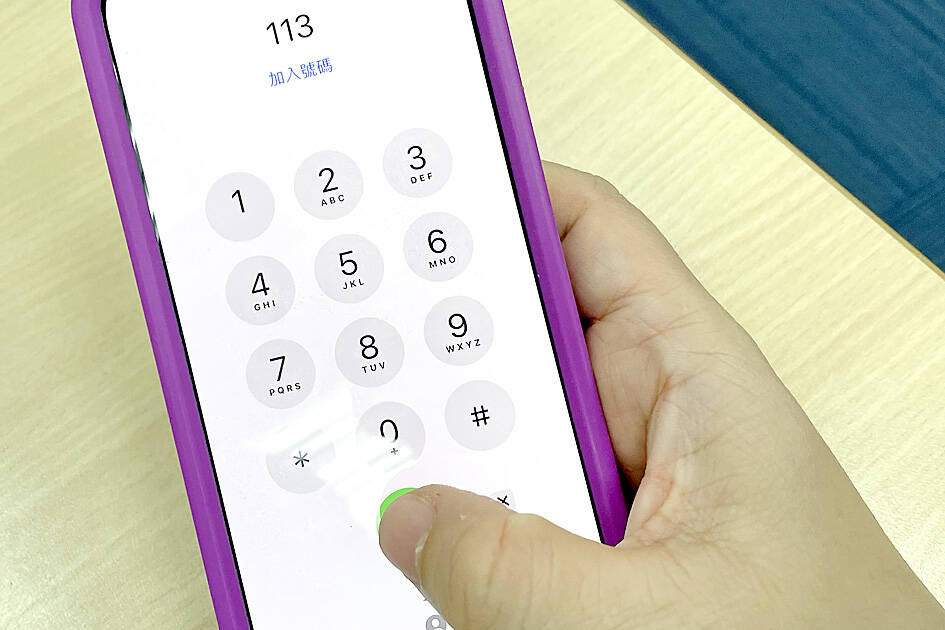Reports of abuse against elderly people over the past five years have grown by 52 percent, with the majority of incidents occurring over the Lunar New Year holiday, the Ministry of Health and Welfare said yesterday.
Department of Protective Services Director-General Chang Hsiu-yuan (張秀鴛) said that most incidents of elderly abuse are due to issues of care or reliance on the finances of elderly people.
Financial problems are especially prevalent over the Lunar New Year holiday, as people working part-time jobs or who are reliant on elderly people would need additional funds due to increased expenses during the holiday, Chang said.

Photo: Chiu Chih-jou, Taipei Times
As Taiwan is moving toward becoming a “hyper-aged” society, the government is seeing a rise in the number of reports of elderly people being abused, she added.
About 40 percent of calls to the 113 hotline were related to domestic abuse, she said.
The all-hours hotline is for people to report incidents or ask questions about domestic violence, sexual assault or harassment, as well as abuse or neglect of children, adolescents, elderly and disabled people.
Many elderly people are unwilling to ask for help, believing that telling others about abuse would bring shame upon their family, she said.
It is most often a neighbor, other family members or the police who report elderly abuse, Chang said.
The Lunar New Year period is when families get together, often after many months, and issues should be discussed with respect and understanding by all members, she said.
If there is a point of contention, people should walk away and cool down before discussing it further, she added.
The 113 hotline would be staffed around the clock throughout the Lunar New Year holiday, Chang said.
In addition to the telephone service, people can also text or use the hotline’s online services, she said.
Additional reporting by CNA

DEFENSE: The National Security Bureau promised to expand communication and intelligence cooperation with global partners and enhance its strategic analytical skills China has not only increased military exercises and “gray zone” tactics against Taiwan this year, but also continues to recruit military personnel for espionage, the National Security Bureau (NSB) said yesterday in a report to the Legislative Yuan. The bureau submitted the report ahead of NSB Director-General Tsai Ming-yen’s (蔡明彥) appearance before the Foreign and National Defense Committee today. Last year, the Chinese People’s Liberation Army (PLA) conducted “Joint Sword-2024A and B” military exercises targeting Taiwan and carried out 40 combat readiness patrols, the bureau said. In addition, Chinese military aircraft entered Taiwan’s airspace 3,070 times last year, up about

The Overseas Community Affairs Council (OCAC) yesterday announced a fundraising campaign to support survivors of the magnitude 7.7 earthquake that struck Myanmar on March 28, with two prayer events scheduled in Taipei and Taichung later this week. “While initial rescue operations have concluded [in Myanmar], many survivors are now facing increasingly difficult living conditions,” OCAC Minister Hsu Chia-ching (徐佳青) told a news conference in Taipei. The fundraising campaign, which runs through May 31, is focused on supporting the reconstruction of damaged overseas compatriot schools, assisting students from Myanmar in Taiwan, and providing essential items, such as drinking water, food and medical supplies,

STRICTER ENFORCEMENT: Taipei authorities warned against drunk cycling after a sharp rise in riding under the influence, urging greater public awareness of its illegality Taipei authorities have issued a public warning urging people not to ride bicycles after consuming alcohol, following a sharp rise in riding under the influence (DUI) cases involving bicycles. Five hundred and seven people were charged with DUI last year while riding YouBikes, personal bicycles, or other self-propelled two-wheelers — a fourfold increase from the previous year, data released by the Taipei Police Department’s Traffic Division showed. Of these, 33 cases were considered severe enough to be prosecuted under “offenses against public safety,” the data showed. Under the Road Traffic Management and Penalty Act (道路交通管理處罰條例), bicycles — including YouBikes and other

A magnitude 4.3 earthquake struck eastern Taiwan's Hualien County at 8:31am today, according to the Central Weather Administration (CWA). The epicenter of the temblor was located in Hualien County, about 70.3 kilometers south southwest of Hualien County Hall, at a depth of 23.2km, according to the administration. There were no immediate reports of damage resulting from the quake. The earthquake's intensity, which gauges the actual effect of a temblor, was highest in Taitung County, where it measured 3 on Taiwan's 7-tier intensity scale. The quake also measured an intensity of 2 in Hualien and Nantou counties, the CWA said.